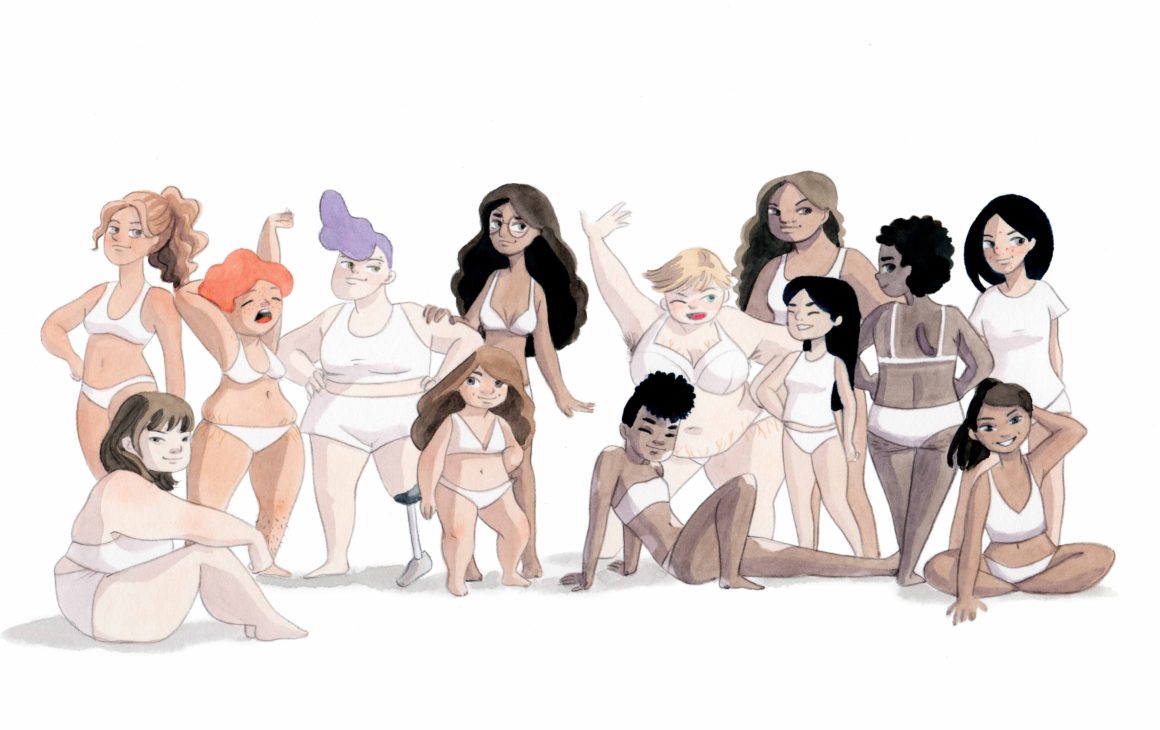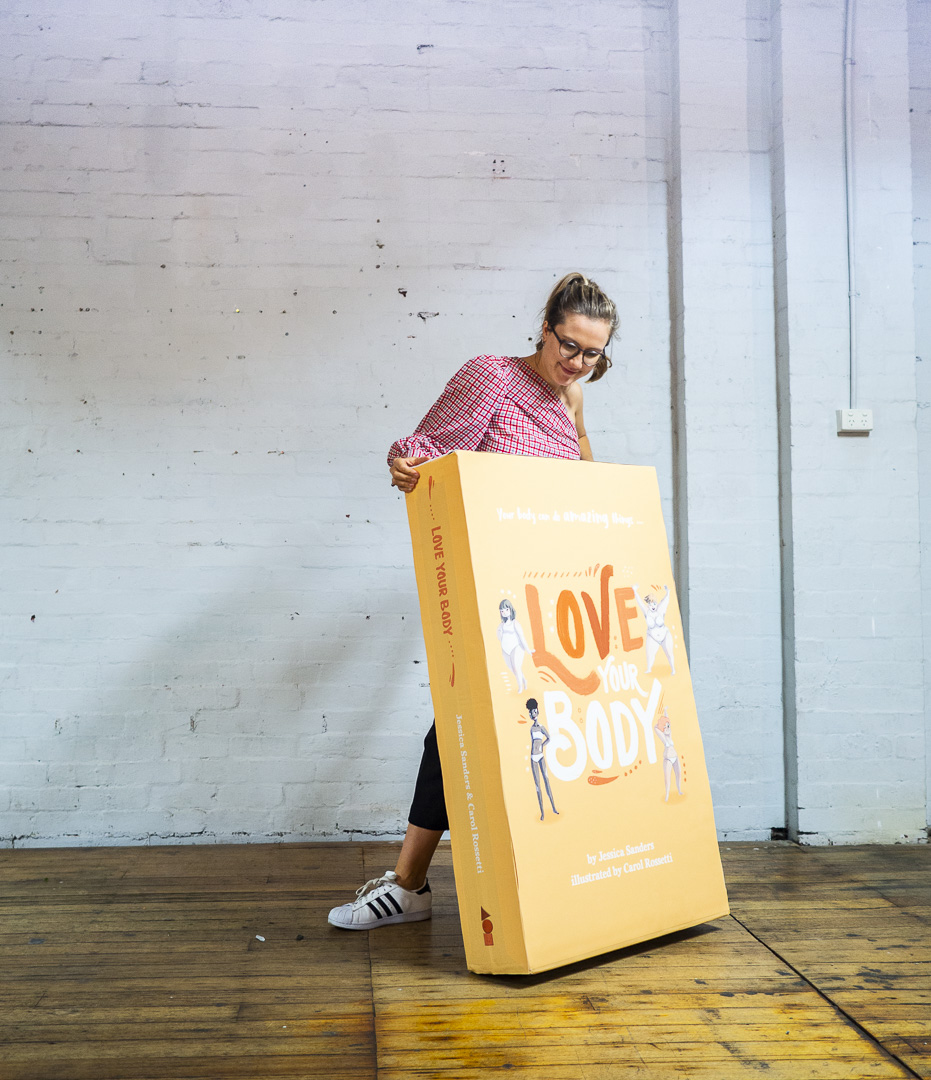In the 2018 Annual Youth Survey conducted by Mission Australia, 30% of young Australians cited body image as one of the key issues they face growing up, with the proportion of stress sitting at a much higher level for young females. The report states that ‘the prevalence of young women indicating concern around body image has been attributed to the pervasive influence of how the media portrays a particular standard of beauty for young women.”
It’s a social issue that we discuss, debate and lament often; it is a problem that, no matter how nuanced, we need to find a solution to. Jessica Sanders, an Australian social worker and author, decided to do just that. Jess is dedicated to empowering others with the tools they need to strengthen the relationship they hold with themselves and their bodies. Her commitment to cheerleading others can be seen in the values of her social enterprise, Re-shape. Jessica founded Re-shape with the primary goal of nurturing a positive body image in young people, by celebrating them for their abilities, brains, and personalities above all else. Previously, Jessica worked at The Butterfly Foundation, where she educated Australian students on the importance of a positive body image. In 2019, Jessica wrote her bestselling children’s book, Love Your Body. To date, Love Your Body has been sold into 25 territories around the world, meaning the book’s important message will now reach millions of children.
Relatable Co-founder Liz spoke with Jess about the inspiration behind Love Your Body, why body diversity needs better representation and what’s up next on her authoring agenda.

What Inspired ‘Love Your Body’?
While working with Year 9 high school students at The Butterfly Foundation, Jess realised how many young girls had already started becoming critical of their bodies. The horror of this, combined with the discovery of an article on underge girls seeking plastic surgery, Jess says, “I just snapped. These girls were so young; it’s so dangerous & life altering.” At such impressionable ages, Jess was already having to help these girls unlearn years of body hatred. “I wanted them to see their bodies as the incredible instruments they are; to admire and celebrate themselves,” she says.
Jess started to do some research and realised that a number of resources already existed, but only in the space of helping women unlearn negative body image and self talk; nothing was out there for young girls on teaching them to love themselves, pro-body image and celebrating diversity. Jess says, “I thought, why not teach them to love being imperfectly perfect in the first place?”
A friend with big ideas suggested Jess write her own book. So that’s just what she did.
‘Love Your Body’ is in now in school libraries. What work are you doing directly with schools?
“Through my mother’s contacts in schools, we created a free student workbook and lesson plans for teachers and educators. This has worked well in the year 6 health curriculum which is all about healthy eating, safety and well-being. The lesson plans helped to expand on what they were already learning and I’ve also been invited to schools to help support the program.”

You have a resources page on your website, which aims to engage children beyond the book, including colouring-in sheets for ages 7-10 to encourage diversity. Tell us about this.
“There’s actually a lovely story to tell about this.”
“I once worked in a high security refuge for Aboriginal women. At the refuge were also a number of children; in particular one little 4 year old girl. I noticed all she wanted to do was colour in, mostly pictures of princesses, always princesses! I noticed that each time she coloured their skin white – obviously unlike her own – so one day I asked why wouldn’t she colour the princesses like herself. Her answer was ‘because my skin looks like poo’.”
“This sad response had quite an impact on me and I realised that Indigenous children don’t really get to see themselves represented anywhere. There are clearly so many layers to this, but I saw colouring-in as an activity in which to engage and start to change that perception.”
It’s so true. More than anyone else, young girls need to see themselves represented. What does it mean for you, as an author, to be so influential in this space?
“I have always said ‘You can’t be what you can’t see’. That we need to see ourselves to feel accepted, and we need to capture diversity in order to do this.”
“I have often seen tears in the eyes of young girls who have experienced huge growth spurts. They identify with me and when I stand on stage before them, they ask me if it gets any better – being tall, that is. My response is always, yes it does, dealing with our differences does get easier. But your height and what you look like isn’t the most important thing about you.”
“I try to plant lots of positive seeds in their young minds, to help indirectly build confidence. Rather than telling them that they are beautiful or they’re not that big, as this (sort of commentary) isn’t constructive. I’ve always understood the importance of role modelling; being the eldest daughter with two younger sisters, role-modelling has always been my responsibility.”

What do you believe are the biggest challenges for body acceptance and size inclusion in Australia?
“I think if we go to the heart of gender stereotypes and how a girl ‘should look’ ; this is the major challenge. I am an ‘average’ size 14 but not represented as such in the marketplace. Brands are still not listening to the market or choosing to see this reality; they are selling an image or size they think a woman or girl should be. The underlying message is then of course, that women shouldn’t be too big or take up too much space.”
It’s wonderful that a book like ‘Love Your Body’ exists for young girls. Do you think it’s also important for mothers, sisters, aunties, uncles, dads & brothers to see books like ‘Love Your Body’?
“I had hoped, and eventually loved that my book did actually get into homes and create change, sometimes (indirectly) for the whole family. I think because the message is so authentic and hard to argue with, I had hoped to also empower mothers as a knock-on effect. I knew the message would resonate with mothers in its simplicity, because it’s what we all deep down know to be true. I believe the messages in the book are, on the whole, universal.”
“I also hoped it would impact and alter the warped images and beauty ideal that boys see from a young age. It’s so important that they see the diversity in women’s bodies and understand that this is true for them too.”

Love Your Body is now being sold in 25 different territories around the world, which is such an awesome achievement! What’s next for you?
“‘Love Your Body’ is coming out in USA, UK & Canada so I’ll be working with my publisher on that. I have another book titled “Me Time – the Self Care Guide to Being Your Own Best Friend” coming out in November, which is for those who may have outgrown picture books but who still need to hear messages of self-care and self-love. Plus I am working on a further book along the theme of expanding the definition of masculinity.”
Head to Re-shape to learn more.





